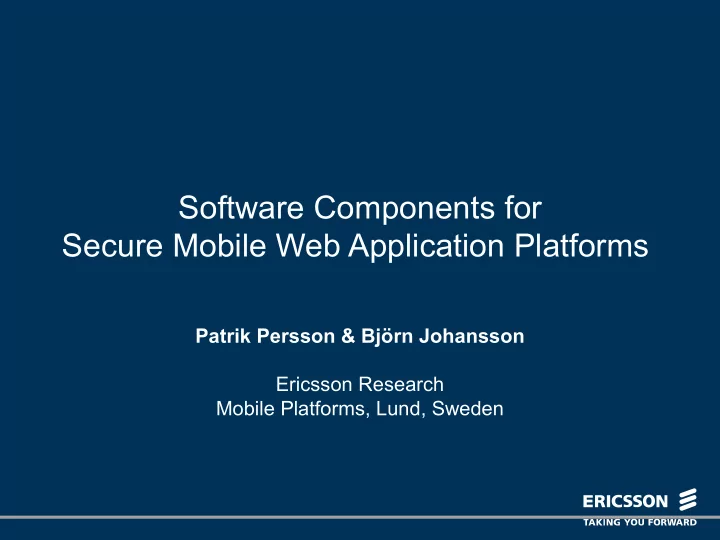

Software Components for Secure Mobile Web Application Platforms Patrik Persson & Björn Johansson Ericsson Research Mobile Platforms, Lund, Sweden
About us Ericsson Research in Lund, Sweden – Device security, application environments, ... – Working tightly with Ericsson Mobile Platforms (EMP) EMBRACE: Ericsson Mobile Browser Research And Cool Extensions – Prototype Widget-based terminal – EMP 3G platform, Linux kernel, Webkit, W3C- style Widgets W3C workshop, London 2 2008-12-11
Motivation: Separation of concerns Need separation of – Platform – Browser engine – Device APIs – Access control Need a vendor-neutral access control mechanism – Assuming policy defined by operator, manufacturer, community, or other Software component technology W3C workshop, London 3 2008-12-11
Why software components? Software component models – Separation of platform and application (separate address spaces possible) – Single entry point centralized access control (method interception) – Can be fairly light-weight (e.g., COM/ECM) Interfaces described in IDL (interface description language) – Translated to glue code in JavaScript, C/C++, Java, ... – Language independence (with limitations) W3C workshop, London 4 2008-12-11
COM/IDL translation example Interface Description Language Generated proxy (IDL) (JavaScript) interface ICall { function ICall (...) { int start (char * nbr); function start (nbr) { ... }; void stop (int session); function stop (session) { ... }; void answer (int session); function answer (session) { ... }; void reject (int session); function reject (session) { ... }; } } Automatic IDL-to-JavaScript translator – COM interface instances JavaScript proxy components – COM callback interfaces JavaScript event handlers Some IDL limitations apply (e.g., regarding void*) W3C workshop, London 5 2008-12-11
Basic architecture JavaScript apps Application Layer Javascript (possibly Implements (de-facto) standard APIs untrusted) Shim Layer in terms of platform primitives Maintains identity of currently Context Layer executing application Trusted Access decision: Access Control Layer platform Map interface required access domain API functionality Platform Layer W3C workshop, London 6 2008-12-11
Conclusions Advantages – Separation of concerns – Language independence (C/C++, Java, JavaScript, Python, Ruby, ...) – Single entry point centralized access control – ECM (COM-like) proven in mobile devices Challenges – Maintaining run-time identity – Dynamically downloadable shim layers? – Performance & footprint – User experience W3C workshop, London 7 2008-12-11
W3C workshop, London 8 2008-12-11
Recommend
More recommend